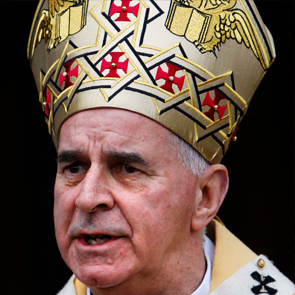The Church of England has been accused of raiding its assets in an attempt to address declining attendance, with a £100 million recruitment plan that has also been criticised for lacking a “proven” growth strategy.
The criticisms come after the church’s General Synod overwhelmingly supported a motion for its Church Commissioners, who manage the Church of England’s £6 billion assets, to sell investments in order to recruit some 50 per cent more clergy.
The vote came after it emerged in December that a separate £2 million has been set aside for a “talent management” programme for “future leaders” proposed by Stephen Green, a former chairman of HSBC and clergyman.
Of the latest proposals, Eve Poole, a former employee of the Church Commissioners, last week told the Financial Times: “My concern is that I think this is a back-of-the-fag-packet solution ... These are big numbers. It's quite a raid on assets without much due process.”
A Church of England spokesman told The Tablet that the criticisms were “misguided”. But Linda Woodhead, the professor of the sociology of religion at Lancaster University, wrote to William Fittall, the outgoing Secretary General of the General Synod, asking to see the “proven growth formulae” which Church Commissioners had claimed was in place.
A Church of England spokesman had described the plans as “targeted funding seeking to fund best practice of implementing proven growth formulae.”
Professor Woodhead, who chairs the Westminster Faith Debates with the former Labour Cabinet minister Charles Clarke, added that the plan amounted to “spending the family silver”.
Responding, Mr Fittall conceded that the phrase “established evidence about growth” would have been preferable for the church to use, rather than “proven growth formulae”.
Professor Woodhead told The Tablet: “I've been urging the Church of England to take decline more seriously for some time now, so I'm delighted that is at last happening. There is a danger, however, that the Church is moving from complacency to blind panic. I wrote to Mr Fittall to ask whether there was a reasoned plan behind the unprecedented proposal to spend over £100m of the Church's historic assets. Although he was courteous enough to reply, he was unable to supply any evidence for thinking that the plan to increase clergy recruitment by 50 per cent will reverse church decline. I wrote as an expert in the area, in the hope that the church will think harder and consult more widely before proceeding.”
Meanwhile, the plans were defended by Sir Tony Baldry, the Conservative MP for Banbury who represents the Church Commissioners in Parliament. He said that while the “specific funding criteria” have yet to be decided on, money would only be released for “focused, evidence-based projects”.
And Andreas Whittam Smith, the First Church Estates Commissioner and a writer for The Independent, said that the Church of England had to face “terrifying” facts about its membership. "The church has got older … but you have to have the same number of younger people joining just to keep level, let alone grow,” he wrote on the Church of England’s Tumblr blog site.
Around a million people attend Church of England services once a week, according to the church’s figures. This is about half the level of attendance in the 1960s.
A Church of England spokesman told The Tablet: “To suggest there has been no thinking nor evidence around church growth would be misguided.”
In January, a strategy paper written by the Archbishop of Canterbury, Justin Welby, and the Archbishop of York, John Sentamu, said that the Church of England needed to promote “numerical growth” by reaching out through digital and social media.


 Loading ...
Loading ...